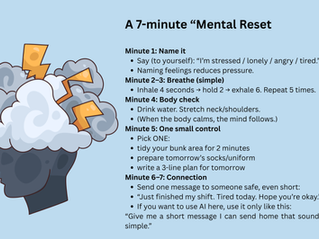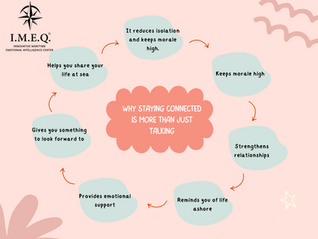Resilience Under Pressure: Managing Burnout During Intense Voyages
- Aug 12, 2025
- 3 min read
The sea can be both your greatest ally and your toughest challenger.One day, you’re standing on deck watching a sunrise so beautiful it’s hard to describe. The next, you’re battling high workloads, unpredictable weather, and endless checklists. Add in long hours, isolation from loved ones, and the pressure to perform—and it’s easy to understand why even the strongest seafarers sometimes feel burned out.

Burnout isn’t weakness—it’s your body and mind sending an urgent message:"Slow down. Recharge. Take care of yourself."
Understanding Burnout at Sea
Burnout is more than just being tired. It’s a state of physical, emotional, and mental exhaustion caused by long-term stress. At sea, where rest times are short and the environment is demanding, burnout can sneak up on you faster than you expect.
Common signs to watch for:
Feeling tired even after sleeping.
Irritability or snapping at others for small things.
Struggling to focus or make decisions.
Losing interest in tasks you usually handle with pride.
Headaches, muscle tension, or stomach issues with no clear cause.
Feeling emotionally distant from your crewmates.
If you recognise several of these signs, you’re not alone—and it’s time to make changes before it gets worse.
Onboard: Protecting Your Energy When the Pressure’s On
Even during the most demanding voyages, there are ways to take care of yourself without neglecting your duties.
1. Micro-Breaks Matter
You may not get an hour off in the middle of a busy shift, but even two minutes to step outside, stretch, and look at the horizon can calm your mind.Tip: Set a small reminder on your watch or phone for a quick break every couple of hours.
2. Fuel Your Body Right
When you’re tired, it’s tempting to load up on coffee and sugary snacks—but they give short bursts of energy followed by a crash.Better choices:
Drink water throughout the day (aim for 2–3 litres).
Snack on nuts, fruit, boiled eggs, or yogurt.
Limit heavy, greasy meals during working hours—they make you sluggish.
3. Talk, Don’t Bottle It Up
Isolation makes burnout worse. A short, honest conversation with a crewmate can change your entire day.
Share how you’re feeling; sometimes you just need to say it out loud.
Ask others how they’re coping—this strengthens team spirit and support.
4. Move Your Body—Even in Small Spaces
Exercise reduces stress hormones and boosts your mood.Onboard-friendly ideas:
Push-ups, squats, planks, resistance bands.
Use stairwells for short cardio bursts.
5–10 minutes daily is better than nothing.
5. Guard Your Sleep Like Treasure
Sleep is when your body repairs itself—don’t compromise it.
Keep your sleeping area cool and dark.
Use earplugs or an eye mask to block noise/light.
Avoid screens for 20–30 minutes before bed—swap them for music, stretching, or reading.
Offboard: Recharging Fully Before Your Next Contract
When you finally step ashore, it can be tempting to fill your schedule immediately—family visits, errands, social events. But remember: you’ve just come from an intense environment. Your mind and body need decompression time.
1. Give Yourself Permission to Rest
The first few days back are your recovery window. Sleep in, take long showers, and let your body reset. Rest is part of your job—it prepares you for the next voyage.
2. Reconnect with Your Passions
Do things you can’t do at sea—gardening, fishing, cooking, playing football with friends. These activities refill your emotional “fuel tank.”
3. Ease Back into Shore Life
Shifting from ship routine to home routine takes time.
Let family and friends know you may need a couple of quiet days first.
Don’t try to do everything in the first week.
4. Move in New Ways
At sea, exercise is often functional and space-limited. At home, take advantage of open areas—go hiking, swim, cycle, or join a fitness class. Different movements refresh your body.
5. Reflect and Plan Ahead
Look back on your last voyage:
What helped you stay strong?
What drained your energy most?
Adjust your personal strategy for next time.
Quick Tips at a Glance
At Sea:Drink more water than you think you need.Use short breaks for deep breathing.Keep conversations open with your crew.Use the stairs for quick fitness boosts.Protect sleep with earplugs and darkness.
Ashore:Rest guilt-free.Make time for your hobbies.Gradually rejoin social life.Move your body in new ways.Learn from your last voyage.
Final Word
The sea demands your strength—but it also rewards your resilience. Burnout is not a sign of failure; it’s a sign you’ve been giving too much without recharging. By taking small steps onboard and giving yourself permission to fully rest offboard, you can keep your energy, health, and spirit strong—voyage after voyage.
Remember: You maintain the ship, but you are also the captain of your own well-being. Steer yourself wisely.





































































































I was diagnosed with Parkinson’s disease four years ago. For over two years, I relied on Levodopa and several other medications, but unfortunately, the symptoms kept getting worse. The tremors became more noticeable, and my balance and mobility started to decline quickly. Last year, out of desperation and hope, I decided to try a herbal treatment program from NaturePath Herbal Clinic.Honestly, I was skeptical at first, but within a few months of starting the treatment, I began to notice real changes. My movements became smoother, the tremors subsided, and I felt steadier on my feet. Incredibly, I also regained much of my energy and confidence. It’s been a life-changing experience I feel more like myself again, better than I’ve felt…